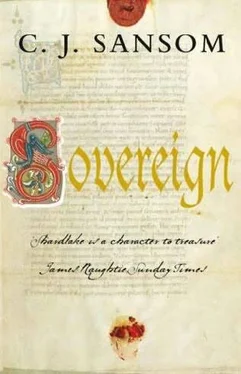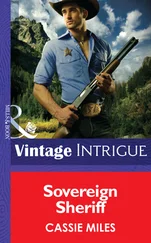He looked me in the eye. ‘I am torn. Part of me wants to stay, settle down, yet part of me enjoyed the excitement this morning.’
‘I saw.’ I took a deep breath. ‘I would be sorrier than I can say to lose you. You have brightened up life in chambers no end. But it is your life, you must decide.’
He smiled sadly. ‘I have been an unruly clerk these last weeks, have I not?’
‘That you have.’
‘I am sorry.’ He bit his lip. ‘I will decide, one way or the other, before we return to London. I promise.’
‘If you want to talk more with me, I shall be ready.’
‘Thank you.’
I drew a deep breath. ‘One more thing,’ I said. ‘I have decided. I think we should get up very early tomorrow, visit the glazier’s house again before this rehearsal of the presentation to King. I am worried Maleverer will say we should have sent a messenger after him. I want to go and check whether the searchers found anything in that room. If there are signs they did, there is less to worry about.’
‘And if they did not?’
‘Then we shall have to look ourselves.’ I spoke with trepidation. Barak’s eyes, though, had lit up at the prospect.
BY THE TIME WE left the refectory the rain had stopped. It was dark now, but in the courtyard the men laboured on. Three enormous tents now stood beside the pavilions, and men were taking furniture inside – ornate chairs, big carved wooden buffets and boxes that probably contained gold plate, for soldiers accompanied them. And all of this, I thought, must have been carried from London.
Back in our lodgings the clerks had brought a small trestle table up to the fire and sat playing cards. Kimber and a couple of other young men in lawyers’ robes were with them and I reflected on the odd, temporary egalitarianism the Progress seemed to have brought to its employees. Kimber asked if we would join them and I told Barak to do so if he wished, but I would go to my cubicle. The words ‘crookback lawyer’s clerk’ still rankled. A little to my disappointment, he said he would. I left him and went to repair my robe as best I could with my little sewing kit, then lay down on my bed.
It was too early to sleep, though, and as I lay there listening to the whoops and groans from the card players as their fortunes changed, I found myself prey to a succession of worrying thoughts. I thought about Maleverer’s sudden dash to visit the Privy Council, and my failure to tell him there might be something concealed at Oldroyd’s house. My decision to go there early on the morrow had been an impulsive one, but on reflection it was the safest thing to do to avoid possible trouble. If there was a hiding place in the wall and it had been discovered, nothing was lost, but if it had not and I discovered it, that could only be to my credit. I did not hide from myself that Maleverer frightened me; he was a man as ruthless and brutal as my old master Cromwell had been, yet without his sophistication, and without, I guessed, any principles beyond ambition and a naked love of exercising power. A brute and a bully, a dangerous man.
And then there was Broderick. I recalled his cold assertion that I was feeding him up for the torturers in the Tower. And yet I must not forget that Broderick had been part of a plot which, had it succeeded, would have plunged the realm into untold bloodshed. I wondered again what secret it was he knew, a secret that even Cranmer was afraid of, then told myself that it was safer not to know.
Eventually the card players trailed off to their cubicles. Through the wall I heard Barak come in next door, and the chinking sound of coins laid on his chest; evidently he had had a successful evening. I undressed and got into bed, but still my thoughts turned in my head, worrying at me. I thought of that strange grim woman Jennet Marlin, with her angry grievance against, apparently, the whole world. And then it came to me whom she reminded me of, with a clarity that made me catch my breath.
My disability had marked me out from my earliest days. I had never been at ease among the boys from the local farms who gathered together and played and hunted rabbits in the woods. I had never been welcomed by them; it was as though in some way I threatened their rough physicality. And hunchbacks are known to bring bad luck.
For some years my only companion at play had been a little girl of my own age. Her name was Suzanne, and she was the daughter of the owner of the farm next to my father’s. The father was a widower, a big rough cheerful man with a brood of five hulking boys. Suzanne was the only girl and after his wife died the farmer did not seem to know what to do with her. One day she had appeared in our yard where I was sailing paper boats in a large puddle. She watched me for a while; I was too shy to talk to her.
‘What are you doing?’ she asked at length.
‘Playing at boats.’ I looked up at her. She wore a dirty dress too small for her and her fair hair stuck out like straw. She looked more like the child of a vagabond than a respectable farmer.
‘I’d like to play too.’ She frowned slightly as she spoke, as though anticipating being told to go away. But I often longed for playmates, and decided even a girl would do. ‘All right.’
‘What’s your name?’
‘Matthew.’
‘I’m Suzanne. How old’re you?’
‘Eight.’
‘So’m I.’
She knelt beside me and pointed to a boat. ‘That one’s lopsided. You ain’t folded the paper very well.’
And so, for the next few years, Suzanne became my playmate. Not all the time – sometimes months would pass when I hardly saw her and perhaps her father had told her she should not be playing with me, but sooner or later she would return and, without explanation for her absence, join in my solitary games. She would cajole me into playing at houses in a corner of her barn, serving water from puddles to her collection of raggedy dolls. She could be bossy but she was company and I felt sorry for her; I think I realized then that she was more of an outcast than I was, an outcast in her own home.
Our friendship, if it could be called that, ended abruptly when we were thirteen. I had not seen her for some months, except at church on Sunday, and then from a distance as her family had a pew on the other side of the church. Walking home after the service one summer’s day, I saw a little group of girls and boys walking ahead of me in the lane. The girls wore coifs tied under their chins and smart, full-length adult dresses, the boys proper little doublets and caps. The girls were jostling for places next to Gilbert Baldwin, a handsome lad of fourteen who had always been the leader in the boys’ games. Trailing behind the group, alone, holding a long hazel twig with which she was beating the long grasses at the side of the road, was Suzanne. I caught up with her.
‘Ho, Suzanne,’ I said.
She turned on me a face that would have been pretty had it not been red and distorted with anger. I noticed that her dress was shabby and had a tear at the hem, her hair wildly uncombed. ‘Go away!’ she hissed furiously.
I stepped back. ‘Why, Suzanne, what have I done?’
She turned round, facing me. ‘It’s all your fault!’
‘Why – why, what is?’
‘They won’t let me walk with them! They say my clothes smell, I’m dirty, I’ve no more manners than a tinker! And it’s all because I spent my time playing with you instead of learning girlish things! Gilly Baldwin tells me I should make eyes at my hunchback friend!’ Her voice rose, became tearful; her mouth was like a great angry ‘O’ in her scarlet face.
I looked up the lane. The troop of lads and girls had come to a halt and were watching the scene. The boys looked uneasy but there was a ripple of nasty laughter from the girls. ‘Suzy’s rowing with her swain,’ one called.
Читать дальше












